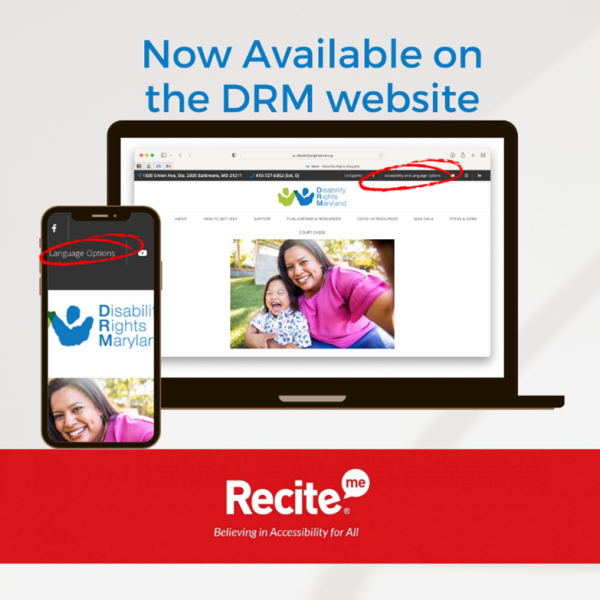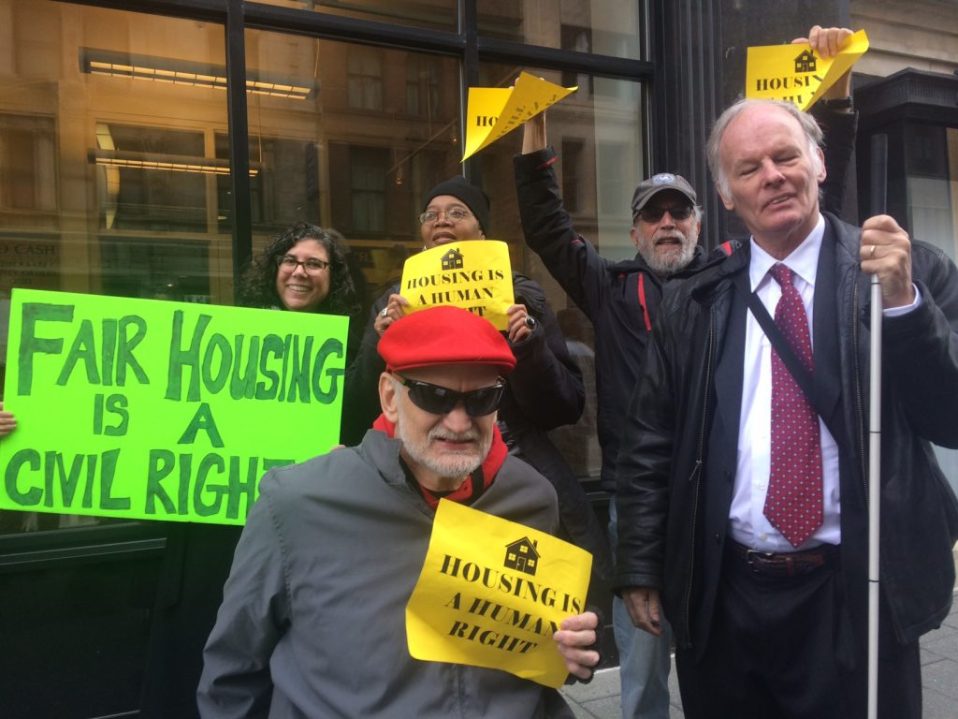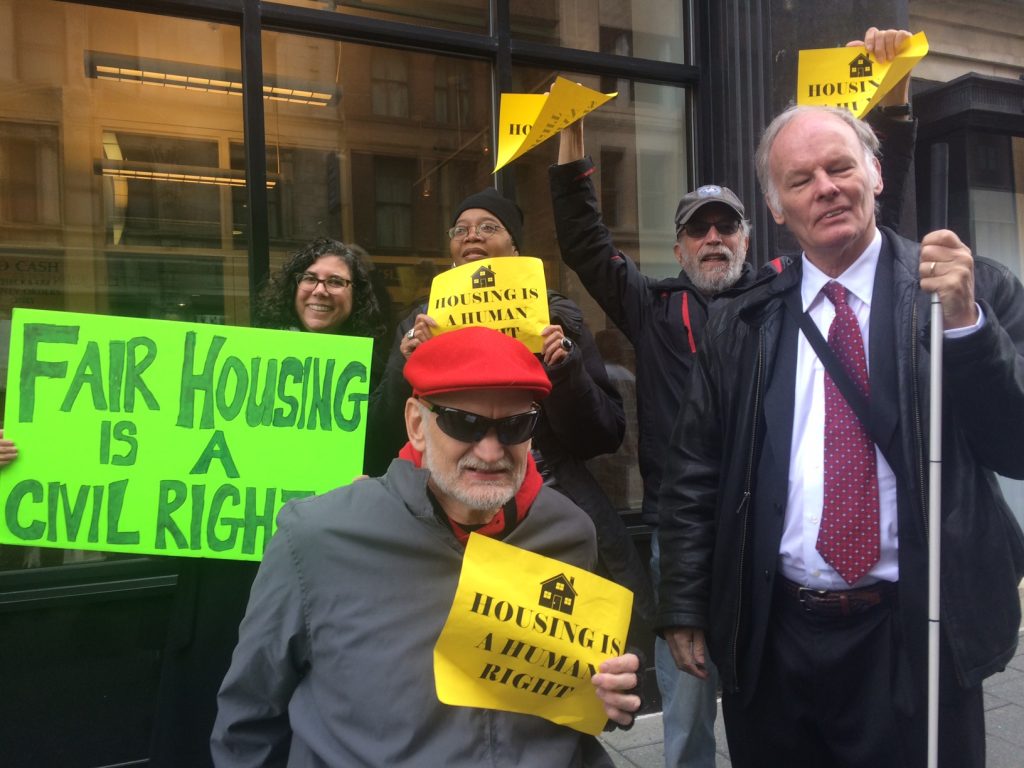Disability Rights Maryland (DRM) is seeking an experienced disability rights leader and advocate to lead this private, nonprofit, 501(c)(3) law firm and advocacy organization as it creates an integrated and just society by advancing the legal rights of people with disabilities throughout Maryland. DRM is Maryland’s designated Protection & Advocacy (P&A) agency and a member of the National Disability Rights Network. We work with people with disabilities to pursue opportunities to champion their rights to self-determination, dignity, equality, opportunity, and freedom from discrimination and harm. We provide free legal services to persons with disabilities in Maryland and engage in systemic litigation and public policy advocacy to positively impact people’s lives. DRM’s work spans a spectrum of issues including criminal justice and prison reform, education, monitoring facilities to investigate abuse, neglect and rights violations, voting, housing, transportation, assistive technology, health care, and the right to self-determination and appropriate services, among others, on behalf of Marylanders with all types of disabilities. DRM envisions a world where people with disabilities are fully included in all aspects of community life.
The new Executive Director will have the opportunity to lead DRM’s experienced and talented team with a positive, results-oriented style that inspires all staff and broadens the circles of support for DRM’s work. The successful candidate will manage DRM in a manner consistent with this core mission and can relay commitment to the mission both inside and outside the organization while demonstrating the highest ethical standards and operating with integrity and transparency in conducting the business of the organization.
HIGH PRIORITY ROLES AND RESPONSIBILITIES:
- To serve as the primary public face of DRM with the disability community, the media, public officials, other nonprofits, and the community at large and to represent the organization in its various local, state, and federal networks;
- To lead, encourage, and inspire a staff that is collaborative, talented, collegial and committed to the well-being of the communities we serve and one another;
- To articulate and nurture a vision for DRM’s future;
- To lead DRM’s community advocacy efforts including disseminating important information, making referrals, providing technical assistance, and training, as well as individual representation and systemic advocacy to promote legal rights for people with disabilities;
- To lead DRM in setting priorities and in planning and pursuing creative strategies for addressing future challenges to the disability community and to the organization;
- Develop and guide fundraising strategies which include cultivating and soliciting major gifts, and working alongside the board and staff to develop actionable fundraising plans;
- To effectively and ethically oversee DRM’s finances in compliance with applicable law and DRM’s mission;
- To grow and diversify resources to support DRM’s work;
- To support an engaged Board of Directors in carrying out its responsibilities to the
QUALIFICATIONS:
- Possession of a Juris Doctor degree and membership in good standing with the Maryland Bar, or ability to obtain membership upon employment;
- A passion for the mission of DRM and its multi-faceted advocacy approach;
- A demonstrated commitment to, and experience with, advancing the rights of persons with disabilities in ways that express the values of inclusion, autonomy, equal access and full participation in community life;
- Experience working with persons with disabilities, including from diverse communities;
- An understanding of the difference between disability rights and disability justice;
- Successful leadership of lawyers and others in a justice-oriented organization;
- Experience managing a similar organization, including staff supervision, budget development, financial oversight, grant and contract compliance, strategic and priority planning, and managing change;
- Experience successfully raising funds from private sources, including foundations and individual donors, and from federal, state and local governments;
- Experience working effectively with multiple organizations and individuals with diverse perspectives, the public, elected and appointed officials, and consumers of services;
- Demonstrated understanding of legislative and executive-level public policy issues and processes, in Baltimore and Maryland a plus;
- Experience working productively with or on an engaged board of directors;
- Interpersonal skills that demonstrate integrity, respect, compassion, collegiality, inclusivity, flexibility, capacity to motivate and thoughtfulness;
- Outstanding communication skills, including written language, with a range of audiences and
- Preference for an individual with lived experience as a person with a disabiiity.
SALARY AND BENEFITS:
The salary range is $130,000 to $160,000 depending on experience and special skills. DRM also offers a very generous benefits package which includes excellent medical insurance, employer-paid dental, prescription, vision, life, and disability insurance, as well as pre-tax savings plans, and a retirement savings opportunity with generous employer contributions. DRM offers eligible employees reimbursement for the cost of spouse or partner-paid health insurance premiums up to an established maximum amount. DRM also offers generous paid time off package, including vacation, holidays, sick time, and more. DRM is headquartered in Baltimore and a hybrid work schedule is available upon approval by the Board.
HOW TO APPLY:
Applications will be accepted until the position is filled and will be reviewed as they are received. Serious candidates should submit applications as soon as possible, but no later than June 30, 2023. Applications should contain a current resume and a thoughtful cover letter outlining how your skills and experience meet the qualifications of the position.
Applications should be submitted by email to Christine Griffin (cgriffin@benderconsult.com) and should include “DRM Executive Director Search” in the subject line. Please include in your message how you heard about the search. Only a select number of highly qualified individuals will be invited to participate in the formal interview process. This is a confidential process and will be handled accordingly throughout all phases of the recruitment and selection process.
Materials should be submitted electronically in Microsoft Word or PDF format.
DRM has retained the executive search firm and certified disability-owned business enterprise, Bender Consulting Services, Inc. to conduct this search, www.benderconsult.com.
DRM is an equal opportunity employer. Qualified individuals with disabilities including those who are also people of color, LGBTQIA+ individuals and others who contribute to staff diversity are encouraged to apply. DRM provides reasonable accommodations to enable individuals with disabilities to perform the essential functions of the position. Please notify us if you need a reasonable accommodation for any part of the application and/or hiring process.
ABOUT DISABILITY RIGHTS MARYLAND:
DRM’s advocacy improves the lives of people with disabilities and creates a more inclusive and just society for all, by advancing human rights. We help people with disabilities pursue opportunities to participate fully in all aspects of community life, and champion their rights to self-determination, dignity, equality, opportunity, and freedom from discrimination and harm.
DRM provides free legal services to Marylanders with disabilities on matters that are related to their disabilities and fall within our advocacy service areas. DRM’s advocacy services are developed in close collaboration with the community of people we serve, and in compliance with our funding sources.
DRM is Maryland’s designated Protection & Advocacy (P&A) agency and a member of the National Disability Rights Network. As such, DRM is part of a nationwide network of organizations working to advance the rights of people with disabilities. Congress established the P&A System in 1975 in response to squalid conditions in institutional facilities for people with disabilities. In creating and funding the P&As, Congress granted us unique statutory authority to conduct investigations of suspected abuse and neglect of individuals with disabilities in facilities.
DRM currently has a budget of approximately $5 million, and a staff of 45, including 19 attorneys, 3 intake specialists, 14 advocates, and 9 administrative support staff. Among the leadership team members are the Director of Litigation, the Director of Finance, the Deputy Director, and the Executive Director.
DRM receives federal funding from several agencies under the following grants:
- Protection & Advocacy for Developmental Disabilities (PADD), U.S. Department of Health and Human Services
- Protection & Advocacy for Individuals with Mental Illness (PAIMI), U.S. Department of Health and Human Services
- Protection & Advocacy for Individual Rights (PAIR), U.S. Department of Education
- Protection & Advocacy for Assistive Technology (PAAT), U.S. Department of Education
- Protection & Advocacy for Traumatic Brain Injury (PATBI), U.S. Department of Health and Human Services
- Protection & Advocacy for Voting Access (PAVA), U.S. Department of Health and Human Services
- Protection & Advocacy for Beneficiaries of Social Security (PABSS), Social Security Administration
In addition, DRM is a grantee of the Maryland Legal Services Corporation. In 2016, DRM was awarded a Victims of Crime Act (VOCA) grant from the Governor’s Office of Crime Control & Prevention. DRM has received support from private foundations including the Harry & Jeanette Weinberg Foundation, Morton K. and Jane Blaustein Foundation, Open Society Institute, Hoffberger Foundation, Zanvyl and Isabelle Krieger Fund, Fund for Change, Steptoe Foundation, Venable Foundation and the Baltimore Bar Foundation. DRM’s governing Board of Directors financially supports the organization with 100% participation. DRM also relies on charitable contributions from individual donors.









